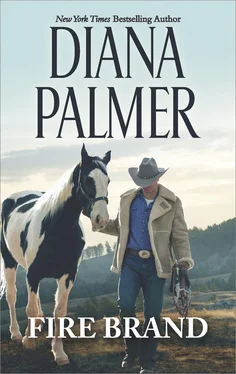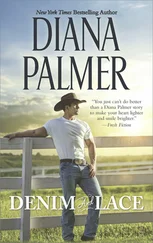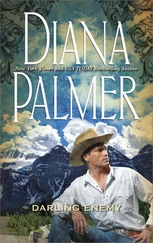Her eyes studied his face inquisitively. “Magda?” She was surprised because she’d always thought of the other woman as being something of a femme fatale.
“Magda.” He blew out a thin cloud of smoke. “It’s an act, can’t you see? A facade to hide her lack of confidence.”
“Remind me never to try and hide anything from you,” she said with a laugh that hid nervousness. He saw deep.
“And this engagement won’t make it to the altar.” He lifted his cigarette to his mouth again, took a draw, and put it out while Gaby studied him with wide eyes. “He’s cutting at her already. Why? Is she pregnant?”
She gasped.
“I thought so,” he mused. “And he feels trapped and wants out. That’s what I mean about marriage, Gaby. People who are sure of what they feel for each other don’t need a trial run.”
“How do you do it?” she asked.
“Do what?”
“Read people like that.”
He shrugged. “I don’t know. It seems to come naturally.” He glanced down at her. “Except with you. Do you know, Gaby, I’ve never been able to read you. I’d hate like hell to play poker with you. You’ve got that kind of face.”
“Oh, I’m an open book,” she said offhandedly.
“No.” He glanced around half irritably. “Have you been here long enough? It’s been over half an hour since we got here.”
He hated parties and dressing up, she knew, and especially when most of the women present were trying to seduce him with their eyes. He had to be the only person in the room who didn’t know how devastatingly handsome he was.
“Yes, I’ve been here long enough,” she agreed. “And I’m rather tired.” It was all catching up with her—the shooting, the news about Aggie’s new man friend, the truth of Mary and Ted’s relationship. She’d never been so depressed.
They excused themselves, wished Ted and Mary happiness with forced smiles, and left.
Bowie parked the car in front of Gaby’s apartment complex and cut the engine. He leaned back in the seat, his hand loosening his tie and unbuttoning his jacket. His head went back with a hard sigh.
“I’ve got to get up in the morning and fly to Canada. Damn it, I hate these trips out of the country,” he said unexpectedly. “I’m getting too old to enjoy them anymore.”
“You aren’t old,” she protested.
“Thirty-six next birthday.” His head turned and his black eyes sought hers in the glaring light from the streetlamps overhead. “Twelve years older than you, cupcake.”
She laughed at the description. “I’m not a cupcake.”
“That’s better. You’ve been gloomy all night.”
“The man they shot was just a boy,” she replied. She leaned back, too, her eyes quiet as they looked through the windshield at the city lights and deserted street. “He had a big family and grew up in the kind of god-awful poverty you read about and wish somebody could do something about. He killed a man and died for twenty stupid dollars, Bowie.”
He stretched, drawing the fabric of his white shirt taut across the firm muscles of his broad chest and flat stomach. “People have died for less. It was his turn.”
“That’s unfeeling,” she accused.
“Is it?” One big arm slid behind her bucket seat and he studied her thoughtfully. “He tried to hold up a store. That was stupid. There are poor people all over the world who live honest lives and made the best of what they have. A man with a gun isn’t going to accomplish a damned thing except his own destruction. That’s basic.”
“It’s still terrible,” she said.
“Why don’t you find something else to do with your life?” he asked. “You’re too soft to be a reporter.”
“What would you suggest I do?” she asked.
“You could come home to Casa Río and help me fight the combine that’s trying to move in next door to us,” he suggested.
“What combine?”
“Some agricultural outfit called Biological Agri-market—Bio-Ag, for short. They’re trying to buy up land in the valley to support a superfarm—the farm of the future, they call it. But I’m afraid that what they’re actually after is a quick profit and some devastating ecological impact.”
“They can’t damage the environment,” she assured him. “First, they have to file an environmental impact statement; then, they have to go through the planning and development commission...”
“Hold it a minute,” he said. “Lassiter doesn’t have a planning commission, and our particular valley isn’t zoned.”
She searched his eyes. “Still, won’t the development have to go through regular channels?”
“If they can get the land,” he agreed. He smiled coolly. “Hell will freeze over before they get any of mine.”
“Then you don’t have a problem.”
“That’s debatable.” He lit a cigarette, cracking a window to let out the smoke. “Some of the town fathers in Lassiter are being courted by the developers. They’re promising jobs and a lavish local economy, and they’re greasing palms right and left.” He smiled at her. “I had a threatening phone call yesterday. The word is that I’m holding up progress single-handedly by refusing to sell land to the development. It seems that Casa Río has the best soil for their purposes.”
“Lassiter could use more jobs, Bowie,” she began slowly. “I know how you feel about the land...”
“Do you?” His voice was like cold steel. “Apaches used to hunt on our range. My great-great-grandfather made one of the first treaties with the Chiricahua Apaches, and there’s a petroglyph that marks the spot where they agreed on it. Cochise camped at one of the river crossings with his people. There was a small fort, and part of the adobe is still standing, where McCaydes helped the Apaches fight off Mexican raiders. There are Hohokam ruins a thousand years old on that land. The Hohokam had a superior civilization that ultimately spawned the Pima and the Tohono O’odham. And the Earps and Doc Holliday rode through on their way to Tombstone. How do you compare that history with a few jobs—jobs that may not even last, for God’s sake, if the developers go bust. And what about the ecology, Gaby?” he persisted, eyes blazing with bad temper. “Imagine all that damned silt pouring into the San Pedro and its tributary near us, when we’re already facing a devastating future. We’ve got the Central Arizona Project and the Salt River Project, and cities are buying ranches all over Arizona for the water rights, but we’ve got to be careful about our water resources, or they may dry up. It’s too risky a venture, despite the potential economic value. What’s worse, I think those Bio-Ag people really have their eyes on our water rights. First in time, first in right, remember? You need easy access to water to farm.”
Gaby studied him quietly. She knew he was a tireless worker for historic preservation. “You’re very knowledgeable,” she remarked.
“It’s an interest of mine. I’m a builder,” he reminded her. “I have to know a lot about the environment and the ecology to be responsible. I don’t want to leave behind a legacy of ruined land for quick gain. There are too many people doing that already—throwing up buildings for a profit without considering how much damage they’re doing to the local ecology.”
“I had to learn about some of that for stories I’ve done,” she replied.
“Silt from irresponsible building practices fills up rivers and streams. That has impact not only on our water resources, but on wildlife, and even the quality of life along those rivers and streams,” he replied. “It’s a subject worth talking about. We’ve been lucky here in Arizona. We have legislators who were looking out for our water rights years before it was a popular subject. We’ve done things to ensure a future water supply. Other states haven’t been quite as responsible, and they may suffer for it someday.”
Читать дальше












